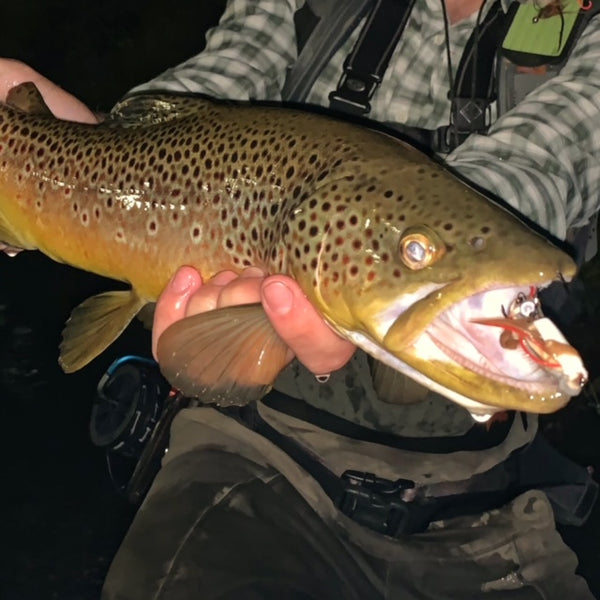
Let’s Face It, in Most Cases Those Big Brown Trout in Your Local River Aren’t Falling Victim To a Size 10 Woolly Bugger or a 16 Prince Nymph
To be honest, you’re probably unaware of what lies beneath the surface tucked against a log jam or wedged under that giant boulder mid-river that you’ve fished countless times. In most cases in my night fishing experience, there’s almost always a much bigger fish that shows itself at night than any other previous fish you’ve might have seen during the daylight hours.
The majority of the largest trout I have ever seen were at night in less than 24” of water. Some of the most dominant predators on the planet feed at night… and brown trout are no different.
Before we go further into tips, tactics, and tackle, I’d like to preface that night fishing obviously has its additional challenges and even dangers. Safety is by far the utmost importance when fishing, especially night fishing. Understanding every inch of the river you plan on night fishing is extremely important. Knowing every boulder, drop off/ledge, and casting obstruction can prevent you from going for an unexpected swim, broken rod, or even a hook to the face (speaking from experience). Always wear eye protection (clear or light illuminating lenses), two headlamps (you’ll drop one in the river), and try to take a fishing buddy with you just for peace of mind.
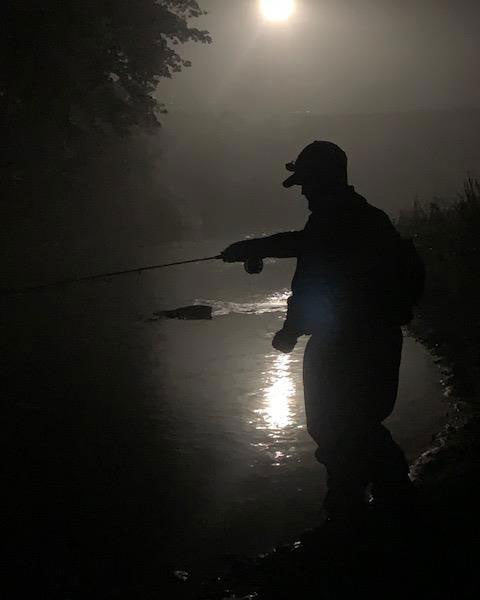
Where I live in Pennsylvania as well as many places in the country, night fishing is more of a seasonal approach. By all means, you can night fish every month of the year and find some success, but there is definitely a “prime time” to be on the water. Typically, I personally begin my night fishing season during the “post hatch” season. After the majority of the caddis and mayflies hatch in May, and the water becomes skinny and shallow, this is when I find brown trout to be starved and more eager to eat larger meals.
This Will Change the Way You Fly Fish Pressured Waters
Night fishing in May, June, and even early July definitely produces plenty of fish, but not THE fish we’re all looking for. Once August rolls around and water temps begin to drop into safe fishing temperatures, that’s when you need to fish until the wheels fall off. Sleep becomes a thing of the past and coffee becomes your best friend. Your best shot at consistently catching brown trout 20”+ and even 24”+ is between August and October.

The worst conditions for daytime fishing are your best conditions for night fishing. Low and clear water is by far the best water conditions to target big brown trout at night. Dominant brown trout adapt and hide so well during these conditions during the daytime which make them almost impossible to target. Once the sun begins to fade, the fish will migrate out of structure and move into feeding areas for the night.
Swing It! Spey Streamer Fly Fishing Tips
A mistake anglers often make is fishing the same deep hole they typically would fish during daytime. Brown trout will move into shallow sandy tail-outs, or push into the head of a run where the water might be less than 24” in depth. The inside seam of a deep pool also offers a great ambush point for a large brown trout.
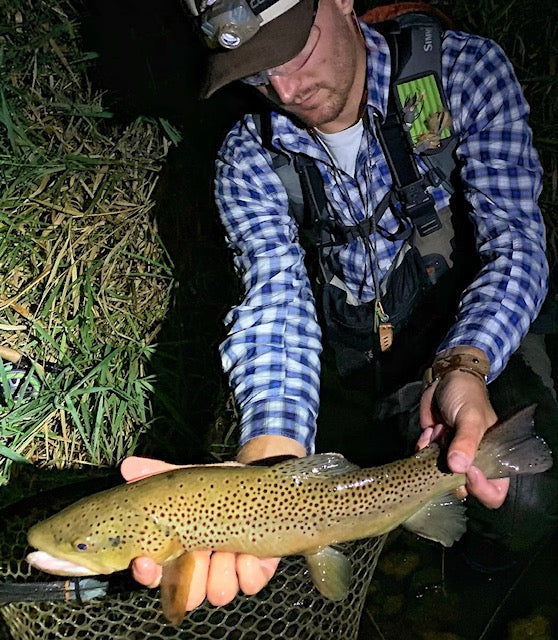
Tackle used when night fishing is very similar to fishing big streamers. Any 6wt, 7wt, or 8wt will suffice. On larger rivers, a trout spey or switch rod works great for swinging streamers or skating rodent patterns across the surface. A floating fly line is the most versatile line for night fishing in my opinion. You can fish surface flies, “pushers” that sit barely subsurface in the surface film, or even a streamer if you want to swing a baitfish into deeper pools. Your leader is extremely important when night fishing as well. Typically when fishing a surface style fly, keeping the leader short and stout is critical. Two feet of 20lb tippet to a blood knot, followed by three feet of 15lb tippet is typical when fishing surface style flies. Your leader needs to be strong and abrasion resistant. It’s not “if,” it’s “when” you toss your flies into a tree.
I have personally witnessed brown trout eat mice, rats, bats, baby birds, and even water snakes. A large brown trout over 24” is not much different than a musky. Don’t be afraid to think outside the box when night fishing. The biggest brown trout I’ve hooked at night was on a 6” rat pattern. The most important aspect of fly design for night fishing in my opinion is how much vibration, water displacement, or surface disruption you can create while not sacrificing your hook gap. Thin, but wide profile deer or foam body mouse flies work great. If using streamers, a pusher style fly that rides high in the water column seems to be extremely effective as well.
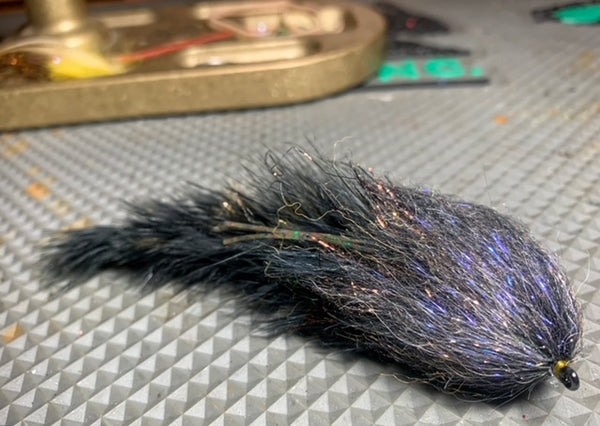

Tied with a Surface Seducer Double Barrel Popper & Slider Body.
How to fish you fly is totally dependent upon on moon phases, cloud coverage/ambient light, and speed of the current. A mouse is not going to swim upstream against the current.
The two most effective retrieves are:
- Down and across just like you would swing a wet fly
- Casting upstream and working the fly back to you
If the current is a classic soft dry fly drift, I almost always work the fly down and across. Your rod tip height as well as your casting angle will dictate the speed of the fly. While fishing short and soft inside seams of a faster run/pool, orienting yourself downstream or below the fish will enable you to cast directly upstream and work the fly right to your feet. This is also a fantastic approach to work upstream along parallel with a heavily wooded bank. I have seen countless times where a fish will strike multiple times with this approach and ultimately eat the fly at your feet after missing 3-4 times in one drift.
Be sure to always start your casts short, most fish are sitting right at your feet!
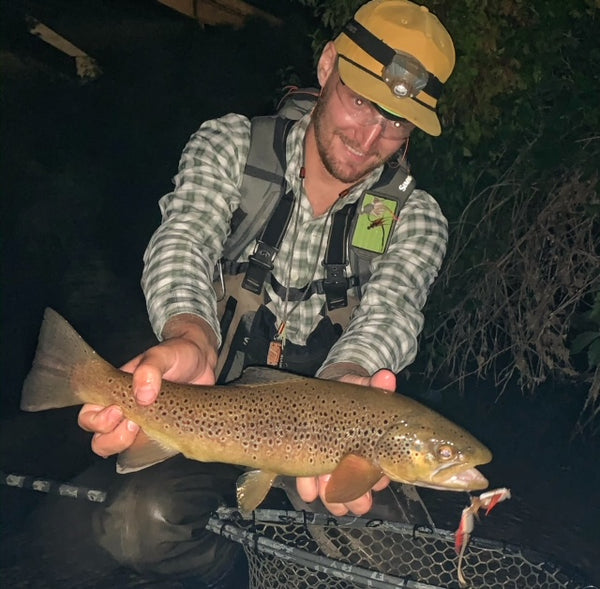
At the end of a long night as the sun begins to rise; rest assure, that legendary fish most likely got away. More times than not, they have to make a series of mistakes in order for you to land them. Whether it ran you into a long jam, bent a 1/0 hook, or it came off just short of the net; the giants of the dark will keep you coming back for more. Tip your cap, swig some spiked coffee and keep after it. More often than not, they’ll leave you with a memory rather than a photo that you will never forget. Some nights, all you’ll have left is a fly patch full of chewed up foam.

Want More Content Like This?
Join the Flymen Mailing List at the bottom of the page!
About Stephen Nymick:
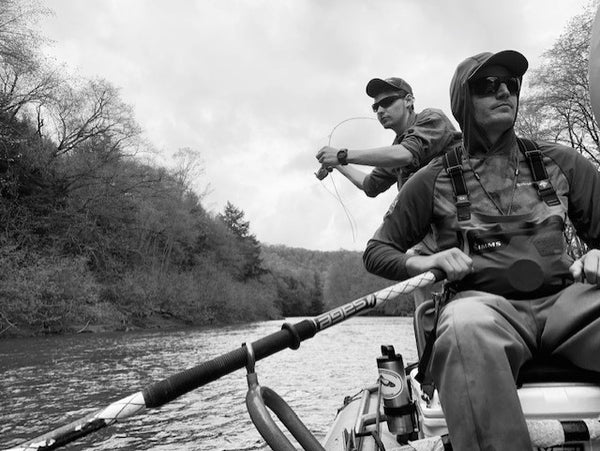
Stephen Nymick is owner of Stephen Nymick Fly Fishing LLC, and a Guide for Steelhead Alley Outfitters. He began fly fishing at just 5 years old on his local streams in Western Pennsylvania. The day his father took him out to get his first fly rod, he also came home with his first fly tying kit. Stephen has been fly fishing exclusively for over 20 years and has guided for 7 years. Throwing big streamers or mice for brown trout and swinging flies for Steelhead are Stephen’s true passions. You can follow Stephen on Instagram @stephennymick. For further questions, email Stephen at [email protected]. To book a trip, contact Steelhead Alley Outfitters at 888-453-5899.








































